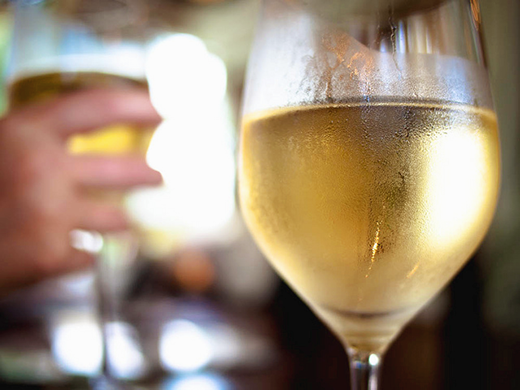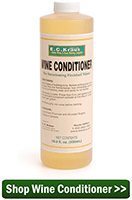 In May I bottled my 2013 Riesling made from Riesling juice. Prior to bottling I filtered the wine, and added simple syrup, potassium sorbate, and kmeta, all in the correct quantities. It tasted very good at bottling time, however, now after a few months has passed, it has become drier and has a slightly bitter finish. What caused this change, and is there anything I can do now to correct it, even if I have to open all 4 cases? Also, what can be done to prevent this from happening the next time I make Riesling? Would ascorbic acid have help prevent this from happening?
In May I bottled my 2013 Riesling made from Riesling juice. Prior to bottling I filtered the wine, and added simple syrup, potassium sorbate, and kmeta, all in the correct quantities. It tasted very good at bottling time, however, now after a few months has passed, it has become drier and has a slightly bitter finish. What caused this change, and is there anything I can do now to correct it, even if I have to open all 4 cases? Also, what can be done to prevent this from happening the next time I make Riesling? Would ascorbic acid have help prevent this from happening?
Name: John S.
State: OH
—–
Hello John,
I don’t know if I have an exact answer for you or not as to why your homemade wine is bitter.
My first thought is that there is some slight fermentation going on in the wine bottle. The increase of yeast cells can make the wine bitter. But, this would be evident by bubbles or sparkle in the wine along with pressure when popping the cork. You did not mention either of these, so I doubt this is what’s going on.
Oxidation can cause bitterness, but it would be more easily identified with a darkening of the wine’s color. If you do not notice the wine turning darker or more brown in color then it is not likely to be from oxidation. By the way, ascorbic acid is what you would add to help protect the wine from oxidation, but it is not required to make a stable wine free from oxidation.
 Bottle shock is something that can bring a flat, lifeless character over the wine. In extreme cases it can cause an off-flavor that one might describe as bitter in the wine. This is primarily because bottle shock can knock the fruity impression out of the wine.
Bottle shock is something that can bring a flat, lifeless character over the wine. In extreme cases it can cause an off-flavor that one might describe as bitter in the wine. This is primarily because bottle shock can knock the fruity impression out of the wine.
Bottle shock occurs after the wine is bottled — or in some more delicate cases — if the wine is excessively disturbed, such as with car travel, etc. It happens when the wine is exposed to too much air to quickly. A little air is needed over time for the wine to age properly. The traditional cork is able to provide this trace amount of air by letting it seep past, but when the wine is bottled or when the wine bottle is jostled around, too much air can pass through the cork and saturate into the wine causing the characteristics of bottle shock.
The good news is that bottle shock is temporary and the wine will recover if given more time.
I do not know if this is what is what’s causing your homemade wine to be bitter or not. If it is, you should notice improvements every 30 days or so. If it is not bottle shock then my guess is that you will notice the bitterness of your wine getting worse through some other reason.
Unless what I have described above is already striking a chord, at this point I would do nothing except observe:
- See if you can determine if a deposit is starting to form in the wine bottles. If so, this would indicate a slight fermentation. Decant the wine back into a common fermenter and let finish.
- Pay attention to the wine’s color. Is it getting darker? Sample a bottle every 30 days. If so then oxidation may be the issue. Store the wine in a cool, dark area.
- Is it getting better? Then bottle shock may be the diagnoses. Give the wine more time to recover.
By paying attention to such things you my be able to start to get a handle on what’s going on.
Without being there, this is about as close as I can get to answer for you. Hopefully, this information will at least get you on the right track.
Best Wishes,
Ed Kraus
—————————————————————————————————————–
Ed Kraus is a 3rd generation home brewer/winemaker and has been an owner of E. C. Kraus since 1999. He has been helping individuals make better wine and beer for over 25 years.

Good afternoon.
I had a barrel of malbec bottled 3 weeks ago. Through out its fermentation I tasted it a couple times a year. In my opinion it was delicious. Yesterday I opened a bottle and poured it into a decanter. There was a little sediment left in the bottle and the wine was bitter. To bitter to enjoy. Would this be bottle shock or do you think something happened during the bottling process
Mike, this is more than likely bottle shock, but I would also sample another random bottle to see if they each taste the same. Sediment should not be in the wine bottle, and I am concerned that maybe some bottles have excessive tannin in them. The sediment could be tannin precipitating from the wine. Tannin could have been concentrated towards the bottom of the barrel causing some bottles to have more tannin than others. Again, it sounds like bottle shock, but I would look out for more deposits in the bottles.